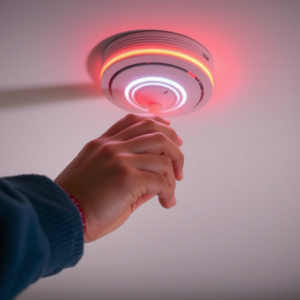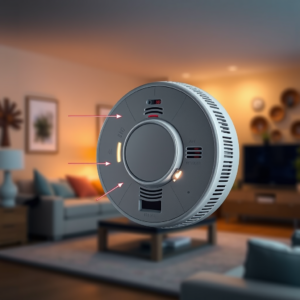When it’s time to sell your house, ensuring it meets specific safety and legal standards is crucial. A crucial aspect of this process involves prioritizing fire safety, which has raised concerns for many homeowners wondering, where are smoke detectors required in a house? Smoke detectors are not only important in saving human lives but also serve significantly in aiding home inspection and providing a smooth real estate transaction. Whether the property is in excellent condition or has experienced fire damage in the past, understanding these requirements could be the key to successfully closing a sale.

Where Are Smoke Detectors Required in a House?
Smoke detector placement is not one size fits all. It may vary from city to city or state to state. However, there are some general guidelines for where they must be installed to meet safety and compliance standards.
Inside Each Bedroom
It is laid down in nearly every law that smoke detectors should be placed in every bedroom or sleeping area for maximum safety. Placing the alarm here provides an early warning to sleeping residents, especially if a fire starts in or near the bedroom.
Outside Sleeping Areas
The smoke detectors should either be placed directly in front of the bedrooms or sleeping areas – generally in long hallways – so that in the event smoke does not enter a bedroom directly, it can still be detected by alarms positioned nearby.
On Every Floor
Local codes generally mandate at least one smoke detector on each floor of a house, including basements. This covers living areas, storage spaces, and attics converted into rooms, ensuring no part of the home is unprotected.
Near Fire-Prone Areas
Installing smoke alarms near kitchens, furnaces, or laundry rooms isn’t always required but is highly recommended. Fires in these areas can spread quickly, and having these devices nearby can help minimize the damage.
Failing to install alarms in these locations could not only jeopardize your safety but also derail the sale of your home. Home inspectors prioritize proper smoke detector placement during evaluations.
Are Smoke Detectors Legally Required to Sell a House?
Yes, in many areas, having functioning smoke detectors installed in the correct locations is a legal requirement to sell a house. Laws and regulations vary from state to state, but here’s why smoke alarms are essential in real estate transactions:
Legal Compliance
Vulnerable states impose specific requirements for smoke detectors to be in place to sell homes. In California, newer smoke detectors are required to have a hardwired power supply with a battery backup. In some states, sellers must also provide proof that the alarms are in active condition.
Mandatory Inspections
Prior to the completion of the sales process, the placing and functioning of smoke alarms will be verified by the buyer’s home inspector. Any legal or safety violations may need to be fixed before the sale can proceed.
Peace of Mind for Buyers
Buyers expect a home to be safe, and well-installed smoke detectors contribute to their confidence. A lack of alarms, or old malfunctioning units, may raise red flags, leading to reduced offers or lost interest.
Top Smoke Detectors to Keep Your Home Safe
When installing or replacing smoke alarms, it’s important to choose the right type for your needs. Here are the main options:
- Ionization Smoke Alarms
They are very good at detecting very fast flaring fires, like grease and dryer fires. On the other hand, these detectors tend to be activated by the pesky smoke generated by cooking. - Photoelectric Smoke Alarms
Suitable for detecting long, smoldering fires, these detectors can be installed well in family areas and in bedrooms.

3. Dual-Sensor Smoke Alarms
Dual sensor alarms combine ionization and photoelectric technologies, making them one of the best options for complete fire protection.
4. Interconnected Systems
Such interconnected alarms communicate with one another. They trigger all units at the same time if one detects smoke. They work best for multi-story homes, especially those with larger designs.
By understanding and addressing smoke detector requirements, you not only safeguard your home but also your real estate transaction. Whether you’re selling a fire damaged house, fire safety is an essential step for every homeowner. With the right preparation, you can create a safer environment and increase the marketability of your property.
Previous